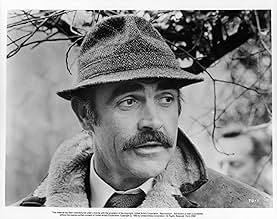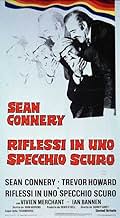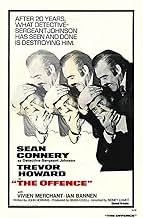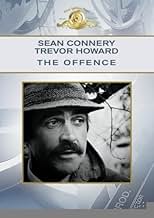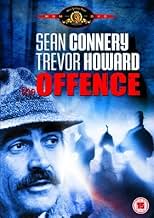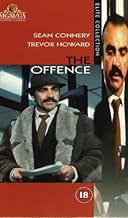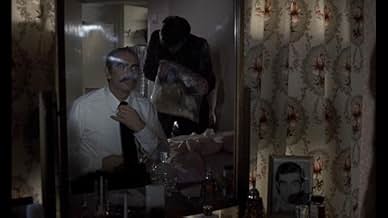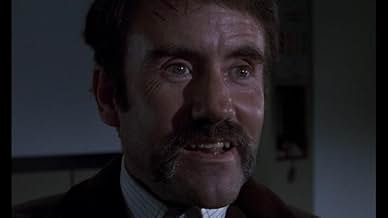IMDb रेटिंग
6.9/10
8.7 हज़ार
आपकी रेटिंग
एक शांत पड़ चुका ब्रिटिश पुलिस जासूस, एक बच्चे से छेड़-छाड़ के मामले में संदिग्ध से पूछताछ करते हुए, आखिरकार अपने गुस्से को बाहर निकालता है.एक शांत पड़ चुका ब्रिटिश पुलिस जासूस, एक बच्चे से छेड़-छाड़ के मामले में संदिग्ध से पूछताछ करते हुए, आखिरकार अपने गुस्से को बाहर निकालता है.एक शांत पड़ चुका ब्रिटिश पुलिस जासूस, एक बच्चे से छेड़-छाड़ के मामले में संदिग्ध से पूछताछ करते हुए, आखिरकार अपने गुस्से को बाहर निकालता है.
- 1 BAFTA अवार्ड के लिए नामांकित
- कुल 1 नामांकन
John Cannon
- Police Constable
- (बिना क्रेडिट के)
Les Conrad
- Detective
- (बिना क्रेडिट के)
Timothy Craven
- Ambulance Man
- (बिना क्रेडिट के)
फ़ीचर्ड समीक्षाएं
A burnt-out British police detective investigates some astonishing crimes but after 20 years what Inspector-Sergeant Johnson (Sean Connery) has seen and done is destroying him. Things go wrong when eventually snaps whilst interrogating a suspected child molester called Baxter (Ian Bannen) . During the course of the interrogation takes place several surprises , twists and unexpected consequences.
Interesting and grim picture with tight editing , magnificent acting , thrills , plot twists , emotion and intense drama . It was originally conceived as a tense as well as thrilling flick about a complex interrogatory . It results to be an adaptation of a stage play titled : ¨This story of yours¨ by John Hopkings about a claustrophobic and strange duel betwen a suspicious child molester and a police officer obsessively convinced of his guilt , both of whom find themselves subtly changing places . Gripping and exciting picture about a cop who wants to investigate a grisly killing with unexpected consequences , outstanding the great Sean Connery playing very well a London detective who explodes at a police interrogation reacting against a child molester . Embedded in a realistic police procedure , thorny dialog and peculiar situations nowadays have a ring of arty melodrama ; nevertheless, riveting at times. Support cast is really excellent , such as: Trevor Howard, Vivien Merchant as starring's wife , Peter Bowles and especially Ian Bannen as prime suspect in a series of brutal attacks on young girls.
The motion picture was compellingly directed by the splendid US director Sidney Lumet , though here he failed at box-office. After starting an off-Broadway acting troupe in the late 1940s, he became the director of many television shows in the 1950s. Lumet made his feature film Adaptation of directing debut with 12 Angry Men (1957), which won the Golden Bear at the Berlin Film Festival and earned three Academy Award nominations. The courtroom drama, which takes place almost entirely in a jury room, is justly regarded as one of the most auspicious directorial debuts in film history. Lumet got the chance to direct Marlon Brando in The Figitive Kind (1960), an imperfect, but powerful adaptation of Tennessee Williams'. Sidney Lumet was a master of cinema , best known for his technical knowledge and his skill at getting first-rate performances from his actors and for shooting most of his films in his beloved New York . He made over 40 movies , often complex and emotional , but seldom overly sentimental . He achieved great successes such as ¨Serpico¨, ¨The Veredict¨, ¨Fail safe¨ , ¨ Morning after¨, ¨The hill¨ , ¨Dog day afternoon¨, ¨Murder on the Orient Express¨ , ¨Network¨ , ¨The Anderson tapes¨and his best considered one : ¨12 angry men¨ . In 2005 , Sidney Lumet received a well-deserved honorary Academy Award for his outstanding contribution to filmmaking. Rating . 6.5/10 . Above average . Well worth watching .
Interesting and grim picture with tight editing , magnificent acting , thrills , plot twists , emotion and intense drama . It was originally conceived as a tense as well as thrilling flick about a complex interrogatory . It results to be an adaptation of a stage play titled : ¨This story of yours¨ by John Hopkings about a claustrophobic and strange duel betwen a suspicious child molester and a police officer obsessively convinced of his guilt , both of whom find themselves subtly changing places . Gripping and exciting picture about a cop who wants to investigate a grisly killing with unexpected consequences , outstanding the great Sean Connery playing very well a London detective who explodes at a police interrogation reacting against a child molester . Embedded in a realistic police procedure , thorny dialog and peculiar situations nowadays have a ring of arty melodrama ; nevertheless, riveting at times. Support cast is really excellent , such as: Trevor Howard, Vivien Merchant as starring's wife , Peter Bowles and especially Ian Bannen as prime suspect in a series of brutal attacks on young girls.
The motion picture was compellingly directed by the splendid US director Sidney Lumet , though here he failed at box-office. After starting an off-Broadway acting troupe in the late 1940s, he became the director of many television shows in the 1950s. Lumet made his feature film Adaptation of directing debut with 12 Angry Men (1957), which won the Golden Bear at the Berlin Film Festival and earned three Academy Award nominations. The courtroom drama, which takes place almost entirely in a jury room, is justly regarded as one of the most auspicious directorial debuts in film history. Lumet got the chance to direct Marlon Brando in The Figitive Kind (1960), an imperfect, but powerful adaptation of Tennessee Williams'. Sidney Lumet was a master of cinema , best known for his technical knowledge and his skill at getting first-rate performances from his actors and for shooting most of his films in his beloved New York . He made over 40 movies , often complex and emotional , but seldom overly sentimental . He achieved great successes such as ¨Serpico¨, ¨The Veredict¨, ¨Fail safe¨ , ¨ Morning after¨, ¨The hill¨ , ¨Dog day afternoon¨, ¨Murder on the Orient Express¨ , ¨Network¨ , ¨The Anderson tapes¨and his best considered one : ¨12 angry men¨ . In 2005 , Sidney Lumet received a well-deserved honorary Academy Award for his outstanding contribution to filmmaking. Rating . 6.5/10 . Above average . Well worth watching .
10tully-2
This is a superb psychological thriller with a brilliant lead performance from Sean Connery.
Connery plays a police detective nearing burn-out, the fuse for which is provided by a child molester on the loose. When a suspect (Ian Bannen) is arrested, the detective takes it upon himself to interrogate the man -- and ends up beating him to death. From there, the film examines what drove the detective to do it, through individual scenes with his wife (Vivien Merchant) and the internal affairs officer investigating the beating (Trevor Howard). The final third of the film takes us step by step through the interrogation, as Bannen turns the psychological tables on Connery, making the detective see exactly the sort of animal that he has become as a result of twenty years of dealing unrelentingly with violence and death.
John Hopkins' screenplay plays very much like a stage play (it was adapted from Hopkins' play "This Story of Yours"), but in this case it works to the film's advantage as Connery's life is compartmentalized (by virtue of the scene structure) in a way that makes his personal life seem completely walled-off from his job, and his job completely walled off from the interrogation. As a result, his character's inability to deal with anything but his job (and consequently, even that) gives us marvelous clues as to why he does what he does. Sidney Lumet's direction -- his third venture with Connery (previously the two worked on two of Connery's best films: "The Hill" (1965) and "The Anderson Tapes" (1971)) -- utilizes the stagy conventions well to advance the story and to enhance the performances.
As for the performances, these are uniformly excellent. Connery has never been better, playing a character who is anything but invulnerable, instead being a bundle of nerves and frustrations which explode into violence at crucial moments. Bannen is every bit his match as a complex, manipulative character who is at the same time sympathetic (as Connery's victim) and repulsive (for the sadistic delight he takes in pushing Connery's buttons). Indeed, one of the strengths of the story is that it is never revealed whether Bannen did in fact molest the children in question -- by doing so, the film makes us understand that this is not the issue. Instead, the film is more about internal demons -- how we all have them, and how we can either control or be controlled by them.
Howard is solid in what is perhaps the least interesting role in the film, but Merchant is phenomenal as Connery's plain wife, who has withstood his emotional abuse and neglect for years, sometimes in silence, sometimes not, but always with dignity. In perhaps one of the most poignant moments in the film, Connery, half-drunk, looks up at her, and asks in wonderment, "Weren't you ever pretty?" Merchant's lines following that are less important for their text, than for her reading of them -- wounded, but still confronting her husband like a prize fighter who's determined not be knocked out by a cheap shot in the fifteenth round.
Perhaps the greatest tragedy of this film is that it is practically unknown in the United States, and that it did not air in enough American theaters to qualify for the Oscars. Otherwise, it would quite likely have resulted in Oscar nominations for Connery (in an otherwise weak year for the Best Actor category, the only comparable performance nominated was Al Pacino's in "Serpico"), Bannen, and Merchant, not to mention Hopkins and possibly Lumet. All the same, definitely a film worth seeing if you're tired of watching detective films where Bruce Willis or Mel Gibson blow away half of Los Angeles.
Rating: ****
Connery plays a police detective nearing burn-out, the fuse for which is provided by a child molester on the loose. When a suspect (Ian Bannen) is arrested, the detective takes it upon himself to interrogate the man -- and ends up beating him to death. From there, the film examines what drove the detective to do it, through individual scenes with his wife (Vivien Merchant) and the internal affairs officer investigating the beating (Trevor Howard). The final third of the film takes us step by step through the interrogation, as Bannen turns the psychological tables on Connery, making the detective see exactly the sort of animal that he has become as a result of twenty years of dealing unrelentingly with violence and death.
John Hopkins' screenplay plays very much like a stage play (it was adapted from Hopkins' play "This Story of Yours"), but in this case it works to the film's advantage as Connery's life is compartmentalized (by virtue of the scene structure) in a way that makes his personal life seem completely walled-off from his job, and his job completely walled off from the interrogation. As a result, his character's inability to deal with anything but his job (and consequently, even that) gives us marvelous clues as to why he does what he does. Sidney Lumet's direction -- his third venture with Connery (previously the two worked on two of Connery's best films: "The Hill" (1965) and "The Anderson Tapes" (1971)) -- utilizes the stagy conventions well to advance the story and to enhance the performances.
As for the performances, these are uniformly excellent. Connery has never been better, playing a character who is anything but invulnerable, instead being a bundle of nerves and frustrations which explode into violence at crucial moments. Bannen is every bit his match as a complex, manipulative character who is at the same time sympathetic (as Connery's victim) and repulsive (for the sadistic delight he takes in pushing Connery's buttons). Indeed, one of the strengths of the story is that it is never revealed whether Bannen did in fact molest the children in question -- by doing so, the film makes us understand that this is not the issue. Instead, the film is more about internal demons -- how we all have them, and how we can either control or be controlled by them.
Howard is solid in what is perhaps the least interesting role in the film, but Merchant is phenomenal as Connery's plain wife, who has withstood his emotional abuse and neglect for years, sometimes in silence, sometimes not, but always with dignity. In perhaps one of the most poignant moments in the film, Connery, half-drunk, looks up at her, and asks in wonderment, "Weren't you ever pretty?" Merchant's lines following that are less important for their text, than for her reading of them -- wounded, but still confronting her husband like a prize fighter who's determined not be knocked out by a cheap shot in the fifteenth round.
Perhaps the greatest tragedy of this film is that it is practically unknown in the United States, and that it did not air in enough American theaters to qualify for the Oscars. Otherwise, it would quite likely have resulted in Oscar nominations for Connery (in an otherwise weak year for the Best Actor category, the only comparable performance nominated was Al Pacino's in "Serpico"), Bannen, and Merchant, not to mention Hopkins and possibly Lumet. All the same, definitely a film worth seeing if you're tired of watching detective films where Bruce Willis or Mel Gibson blow away half of Los Angeles.
Rating: ****
British film adaptation of John Hopkins' play "This Story of Yours", penned by the playwright, concerns a troubled 20-year veteran of the police force privately interrogating a suspicious-seeming man picked up the same night a schoolgirl was found molested in the woods. The accused almost inadvertently manages to get inside the other man's head until the tables are turned and it's the cop who is suddenly examining his own dark, turbulent thoughts (he's forced to see the ugly truth, that the two men are not unlike each other). Extremely heavy (as it must be) and unrelievedly talky, the film, directed by Sidney Lumet, is a psychological think-piece, one that was very important to its star, Sean Connery. Erasing all traces of James Bond, Connery sinks deep into this tortured character, with Ian Bannen riveting as the suspect. The film begins confusingly, and audiences must get over another hurdle: a second-act argument between Connery and his wife that eats up a lot of time on the clock. Those who stick with it, however, will find the adult material tense, intriguing and haunting. **1/2 from ****
After returning to save the James Bond franchise with "Diamonds Are Forever," Sean Connery made a complete left-field choice for his next role. In "The Offence," he plays a stressed-out police officer on the verge of a nervous breakdown who is in a physical and psychological battle with a paedophile suspect he has in custody. Connery's character is also struggling with his own paedophile tendencies. It is an adaptation of John Hopkins play "This Story of Yours." It is essentially a two-hander for the most part with Connery and Ian Bannen (as the paedophile) trying to get the better of one another in the interrogation room of a police station.
Even though Sean Connery won his only Oscar for "The Untouchables", for me, this is by far his best performance. He is an absolute powerhouse in this going from shouting, snarling rage to raving and ranting about paedophiles to then sobbing like a child and begging forgiveness.
Ian Bannen is, if anything, even better than Connery here. His character veers from confused innocence to leering guilt, from screaming frustration to self-pity and then back to arrogance. It's an amazing performance. Sadly, Ian Bannen was killed in a car crash a few years back. A huge loss to the acting community.
While "The Offence" on the surface seems like a very British police procedural drama, it was, surprisingly, directed by the American Sidney Lumet. Like Lumet's best movies ("Twelve Angry Men," "The Hill", "Serpico" and "Dog Day Afternoon") this film features a character in an extremely pressurized situation. It's brave film-making at its darkest. Hollywood certainly took notice as Lumet was chosen to direct a young Al Pacino in two of his breakthrough movies "Serpico" in 1973 and "Dog Day Afternoon" in 1975 after this.
This is the kind of film that would not only never be made today, to even suggest it as an idea for a film would probably be the end of your career. So, if you're tired of CGI monsters and explosions and you want to experience raw acting at its finest, get a copy of this film. It is uncomfortable viewing due to its disturbing subject matter, but you won't see better acting anywhere. Highly recommended.
Even though Sean Connery won his only Oscar for "The Untouchables", for me, this is by far his best performance. He is an absolute powerhouse in this going from shouting, snarling rage to raving and ranting about paedophiles to then sobbing like a child and begging forgiveness.
Ian Bannen is, if anything, even better than Connery here. His character veers from confused innocence to leering guilt, from screaming frustration to self-pity and then back to arrogance. It's an amazing performance. Sadly, Ian Bannen was killed in a car crash a few years back. A huge loss to the acting community.
While "The Offence" on the surface seems like a very British police procedural drama, it was, surprisingly, directed by the American Sidney Lumet. Like Lumet's best movies ("Twelve Angry Men," "The Hill", "Serpico" and "Dog Day Afternoon") this film features a character in an extremely pressurized situation. It's brave film-making at its darkest. Hollywood certainly took notice as Lumet was chosen to direct a young Al Pacino in two of his breakthrough movies "Serpico" in 1973 and "Dog Day Afternoon" in 1975 after this.
This is the kind of film that would not only never be made today, to even suggest it as an idea for a film would probably be the end of your career. So, if you're tired of CGI monsters and explosions and you want to experience raw acting at its finest, get a copy of this film. It is uncomfortable viewing due to its disturbing subject matter, but you won't see better acting anywhere. Highly recommended.
To me "The offence" is a must. I think this film deserves to be rediscovered and reaprecciated, because it shows two giants of the cinema at their peak.
Actually the film stars Sean Connery -here in his first role after quitting the official James Bond series-, he's directed by his long time friend Sidney Lumet, one of the most talented American directors. The movie is like a theatrical piece, there's not much action. Everything stands on the actors and their expressions, the atmosphere is dark and depressing. But this is is the goal of the story. Sean is a 40 years old policeman, who faces again with a case of child abuse. He's used to deal with the most miserable stories of humanity... But this time his rage and frustrations explode: he beats a suspected person (Ian Bannen) and loses the control, he kills him. He's suspended from the service.
The movie is a psychological study of a hard man, who loses his dignity and understands too late he's a disturbed man as well. "The offence" is a small British film, a big contrast to the lavish 007 productions. We have not a hero here, we have an actor who proves once more to be a wonderful performer -here the desperation of his character is really deep.
In 1972 the movie didn't enjoy a big success, it has been revalued with the time. (maybe the story was too sad and disturbing for being a hit). Today it's considered a milestone in Connery's career. Of course it is.
Actually the film stars Sean Connery -here in his first role after quitting the official James Bond series-, he's directed by his long time friend Sidney Lumet, one of the most talented American directors. The movie is like a theatrical piece, there's not much action. Everything stands on the actors and their expressions, the atmosphere is dark and depressing. But this is is the goal of the story. Sean is a 40 years old policeman, who faces again with a case of child abuse. He's used to deal with the most miserable stories of humanity... But this time his rage and frustrations explode: he beats a suspected person (Ian Bannen) and loses the control, he kills him. He's suspended from the service.
The movie is a psychological study of a hard man, who loses his dignity and understands too late he's a disturbed man as well. "The offence" is a small British film, a big contrast to the lavish 007 productions. We have not a hero here, we have an actor who proves once more to be a wonderful performer -here the desperation of his character is really deep.
In 1972 the movie didn't enjoy a big success, it has been revalued with the time. (maybe the story was too sad and disturbing for being a hit). Today it's considered a milestone in Connery's career. Of course it is.
क्या आपको पता है
- ट्रिवियाWhen Sean Connery agreed to return as James Bond in Diamonds Are Forever (1971), as part of his deal, United Artists had to back two movies of his choice that would cost $2 million or less. This was to be the first; a Connery-directed version of "Macbeth" was to be the second. When this movie failed at the box office and Roman Polanski beat Connery to the screen with The Tragedy of Macbeth (1971), Connery's version of "Macbeth" was cancelled.
- गूफ़A ladder leaning against the wall in the hallway outside of the police interrogation room is clearly labeled "TFS" for "Twickenham Film Studios."
- भाव
Kenneth Baxter: Nothing I have done can be one half as bad as the thoughts in your head.
- कनेक्शनFeatured in Big Screen: The Battle of the Bonds (1998)
टॉप पसंद
रेटिंग देने के लिए साइन-इन करें और वैयक्तिकृत सुझावों के लिए वॉचलिस्ट करें
- How long is The Offence?Alexa द्वारा संचालित
विवरण
- रिलीज़ की तारीख़
- कंट्री ऑफ़ ओरिजिन
- भाषा
- इस रूप में भी जाना जाता है
- Sein Leben in meiner Gewalt
- फ़िल्माने की जगहें
- The Carnival Public House, Battersea, लंदन, इंग्लैंड, यूनाइटेड किंगडम(pub scene: interior)
- उत्पादन कंपनी
- IMDbPro पर और कंपनी क्रेडिट देखें
बॉक्स ऑफ़िस
- बजट
- $9,00,000(अनुमानित)
इस पेज में योगदान दें
किसी बदलाव का सुझाव दें या अनुपलब्ध कॉन्टेंट जोड़ें

